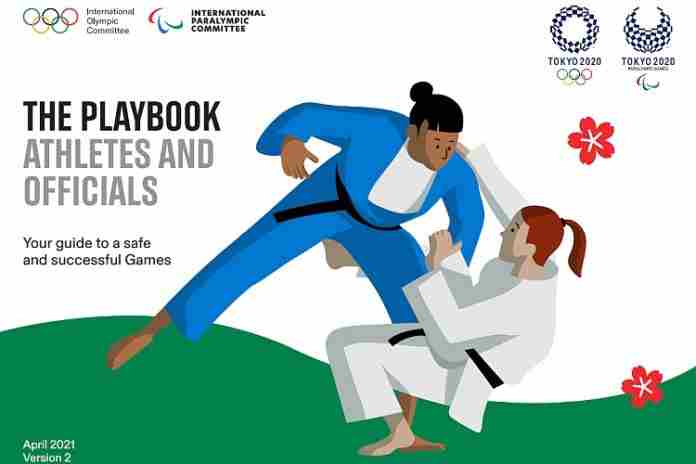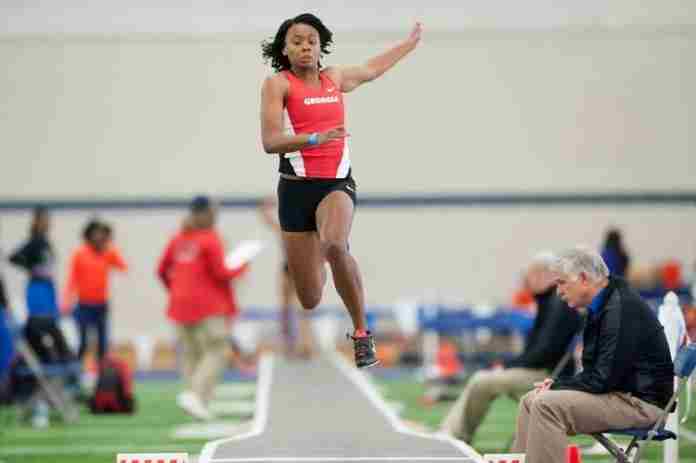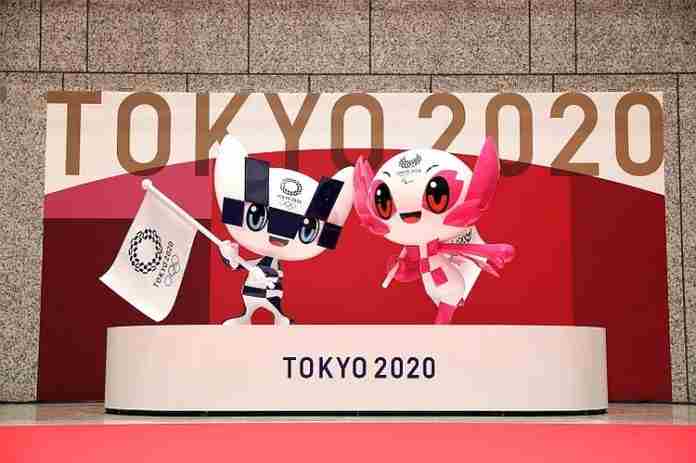“These Games will be different and we all have to adjust. In addition to no overseas spectators, you will face restrictions to the places you can go to, as well as hygiene and physical distancing measures. These ‘safety first’ decisions are there to protect you, all Games participants and the people of Tokyo and Japan. …
“The COVID-19 countermeasures described in the Playbook are designed to create a safe Games environment for all Games participants. Equally, they offer an additional layer of protection for our hosts, the residents of Japan. You must fully adhere to the Playbook throughout your time in Japan, keeping your interaction with non-Games participants to a minimum.”
That’s the main message of the second edition of the IOC’s Tokyo 2020 “playbook” for this summer’s Olympic Games, released on Wednesday. Expanded from 33 to 60 pages, the second version of the Athletes and Officials Playbook presents a formidable program of restrictions, testing and countermeasures for those heading to Tokyo:
● Athletes and officials are instructed to take their temperature daily for two weeks prior to leaving for Japan and to take Covid-19 tests on two separate days within 96 hours of leaving for Japan, and to get a certificate of negative test results.
● For contact tracing if needed: “Prepare a list of the people you will spend time with regularly while in Japan (format to be agreed with your [Covid-19 Liaison Officer]), for example, your roommate, coach, physiotherapist and immediate members of your team.”
● Once in Japan, the “Contact Confirming Application” smartphone app (“COCOA,” in six languages) must be on, in case contract tracing is needed, and a Covid test (“currently saliva antigen”) will be administered at the airport.
Sign of the times: “All visitors to Japan are required to have a smartphone. In the exceptional case of someone arriving without one, an alternative solution will be explored. All athletes will receive a Samsung smartphone at the Olympic and Paralympic Village.”
● Quarantining on arrival has been relaxed, from 14 days after arrival to none, so long as “you test negative for COVID-19 every day” and “you operate under a higher level of supervision by Tokyo 2020.”
● That means: (1) “Wear a face mask at all times to protect you and everyone around you.” The only exceptions are for “eating, drinking, sleeping, training or competing” (also interviews) and
(2) Physical contact is again proscribed: “Keep physical interactions with others to a minimum” and “Keep two metres’ distance from athletes and at least one metre from others, including in operational spaces.”
● Pre-Games training camps or post-Games Host Town exchange programs are also part of the restrictions: “In principle, your destinations will be limited to your accommodation, training facilities and exchange programme locations. Public transport cannot be used unless it is the only option to reach certain locations, such as remote venues.”
● An activity plan for time to be spent in Japan is required and will be reviewed by the Japanese authorities. The plan requires a list of “All planned and possible destinations – restricted to official Games venues and limited additional locations, as defined by the list of permitted destinations.”
● Athletes will be expected to monitor and report their temperature daily on another smartphone app, and to have their temperature checked on arrival at any Games venue. A reading of 37.5 C (99.5 F) or higher will not allow you to enter.
● Covid testing will be done daily, usually by the saliva antigen method, with results reported within 12 hours. If positive, a second test will be required and the athlete will be required to wait at the Village clinic until the results are confirmed (3-5 hours). If an athlete has Covid:
“You will either be required to continue isolating or be hospitalised. You will not be allowed to compete/continue your role. The location and length of your isolation period will be determined by the Japanese health authorities, depending on the severity and symptoms of your infection”
● “Follow only the activities you have outlined in your Activity Plan: (1) You must only leave your accommodation to go to official Games venues and limited additional locations, as defined by the list of permitted destinations. Permitted destinations are those that are critical for the Games and will have COVID-19 countermeasures in place; (2) Minimise contact (within one metre [or 2 m for athletes]) with Games participants who have been in Japan for more than 14 days, and with residents of Japan; (3) Wear a face mask at all times; (4) You must not use public transport; (5) You must not visit tourist areas, shops, restaurants or bars, gyms, etc; (6) You are strongly encouraged to stay at accommodation provided by Tokyo 2020.”
Essentially, the message is “‘come, compete and leave.” Acrylic panels will be everywhere. Look for athletes to be putting masks on immediately after competitions; mixed-zone interviews will last no more than 90 seconds and require boom microphones. Masks will be required during victory ceremonies. Athletes are expected to leave within 48 hours after their last competition. This is a business trip. And, of course:
“Failure to comply with these rules, such as the intentional refusal to take a test, may result in disciplinary consequences, such as the withdrawal of your accreditation and right to participate in the Olympic and Paralympic Games.”
More details are coming at the end of May, with the issuance of further guides for athletes, team leaders and technical officials. The third edition of the playbooks are expected in June, and “could include more restrictions than those currently listed.”
Not much fun, huh? And the new Playbook also includes the expected:
“However, despite all the care taken, risks and impacts may not be fully eliminated, and therefore you agree to attend the Olympic and Paralympic Games at your own risk.”
This really will be a Games like no other and how well athletes, coaches, officials and their National Olympic Committee staffs handle these protocols will have a significant impact on the competitions.
As noted in a previous commentary on dealing with anti-doping procedures – which will be in full force in Tokyo – it’s not all glory and free shoes.
You can receive our exclusive TSX Report by e-mail by clicking here. You can also refer a friend by clicking here, and can donate here to keep this site going.
For our 649-event International Sports Calendar for 2021 and beyond, by date and by sport, click here!


























